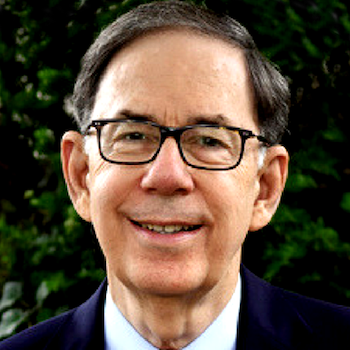Back to series


Don't Be Afraid: God is in Control
by Thomas Tarrants, III, D.Min.
President Emeritus of the C.S. Lewis Institute
In troubled times like these, existential threats to our health, families and livelihoods can loom large, robbing us of peace. Fear and anxiety can become our constant companions, propelling us into a downward emotional spiral and feelings of hopelessness and despair. The future can seem bleak; indeed, it can be bleak.
Many older people, like me, can still remember the Asian Flu in 1957, which killed 1.1 million people worldwide, including 116,000 in America, and the Hong Kong Flu in 1968, which killed 1 million people worldwide, 100,000 of which were in America. We also remember the Cuban Missile Crisis, which brought America to the brink of nuclear war with the Soviet Union. Each of these struck deep fear and anxiety in almost everyone. And now we are faced with the grim spectra of COVID-19.
Where can we look for help in such times? In the face of the most terrifying calamity he could imagine, the Psalmist was confident that God was ultimately in control of the world. He said, “God is our refuge and strength, a very present help in trouble. Therefore, we will not fear though the earth gives way, though the mountains be moved into the heart of the sea, though its waters roar and foam, though the mountains tremble at its swelling” (Psalm 46:1–3, ESV).
Compassionate and Sovereign
God is the One to whom we must turn in such times. He is the sovereign, all-knowing, all-wise, all-powerful, Creator of heaven and earth. And He is our heavenly Father, who loves us and is truly “a very present help in trouble.” Nothing takes him by surprise, and nothing can thwart his will. He tells us, “I am God, and there is no other; I am God, and there is none like me, declaring the end from the beginning and from ancient times things not yet done, saying, ‘My counsel shall stand, and I will accomplish all my purpose’” (Isaiah 46:9–10, ESV). God cares for us and will be with us no matter what befalls us, “for as high as the heavens are above the earth, so great is his steadfast love toward those who fear him” (Psalm 103:11, ESV). Truly, “as a father shows compassion to his children, so the Lord shows compassion to those who fear him. He knows our frame, he remembers that we are dust” (Psalm 103:13-14, ESV). Yes, God knows very well how weak and frail we are, how prone we are to fears and anxieties in life, and how easily we can feel overwhelmed – and He looks on us with compassion. The more we ponder His grace and love and Fatherly care for us, the more our hearts will overflow with grateful love and peace. And when we turn to him, we shall find His arms open and waiting. Truly, our only hope is God and his Son, Jesus Christ, who alone can give us the help and comfort we need in these difficult days.

Turning to God is not a sentimental glance in his direction but a focus on who He is and a confident trust in him to be with us and to help us. King David, who had faced many dangers, said, “The Lord is my light and my salvation; whom shall I fear? The Lord is the stronghold of my life; of whom shall I be afraid?” (Psalm 27:1, ESV). He tells us, “I sought the Lord, and he answered me and delivered me from all my fears. Those who look to him are radiant, and their faces shall never be ashamed” (Psalm 34:4–5, ESV). And he encourages everyone, “Trust in him at all times, O people; pour out your heart before him; God is a refuge for us” (Psalm 62:8, ESV). The prophet Isaiah, living in turbulent times, could testify that, “You keep him in perfect peace whose mind is stayed on you, because he trusts in you. Trust in the Lord forever, for the Lord God is an everlasting rock” (Isaiah 26:3–4, ESV).
Receiving God's Peace
To his fearful, anxious disciples, Jesus said, “Peace I leave with you; my peace I give to you. Not as the world gives do I give to you. Let not your hearts be troubled, neither let them be afraid” (John 14:27, ESV). With that truth in his mind and heart, Peter, in the shadow of Nero’s persecution, could say to believers, cast “all your anxieties on him, because he cares for you” (1 Peter. 5:7, ESV). Similarly, Paul could say, “do not be anxious about anything, but in everything by prayer and supplication with thanksgiving let your requests be made known to God. And the peace of God, which surpasses all understanding, will guard your hearts and your minds in Christ Jesus” (Philippians 4:6–7, ESV).
Trusting God in the storm does not mean we will be untouched. God does not promise that we will escape suffering and pain in this fallen world, but he does promise to be with us as we pass through it. In the storms I have been through, I’ve found Isaiah 43:1–3 to be true, “Fear not, for I have redeemed you; I have called you by name, you are mine. When you pass through the waters, I will be with you; and through the rivers, they shall not overwhelm you; when you walk through fire you shall not be burned, and the flame shall not consume you. For I am the Lord your God, the Holy One of Israel, your Savior.” Best of all, Jesus assures us, “I am with you always, to the end of the age” (Matthew 28:20, ESV). All of these come together for me in the first question of the Heidelberg Catechism: Question: “What is your only comfort in life and death? Answer: That I am not my own but belong body and soul to my faithful Savior Jesus Christ.”
What if our worst fears come to pass – job loss, sickness, even death? It may not be easy, but God promises to be with us through these things as well, and even to use them for good in our lives (the good of our souls in becoming more like Jesus). As Paul said, “we know that for those who love God, all things work together for good, for those who are called according to his purpose” (Romans 8:28, ESV). Having been through a number of painful experiences in life, I can look back and see how God has been with me and has used them to help me become more like Jesus, and I am grateful. But I think there is a caveat. Suffering forces upon us a binary choice: we must either turn to God or away from God.
Facing the Future with Faith
We can face the future in faith or in fear. Walking in faith means keeping our eyes on God and his promises, and not on our problems We can do this because He has given us “a spirit not of fear, but of power and love and self-control” (2 Timothy 1.7, ESV). This means we can reject fear and trust God, who loves us, who rules the world, and for whom nothing is impossible. If instead we focus on our problems, it will only feed fear in our hearts and undermine our faith. Jesus’s disciples were terrified as they desperately fought to survive a life-threatening storm on the Sea of Galilee. Only when they turned their eyes upon Jesus and cried out for his help did they find deliverance (Mark 4:35-41, ESV). Truly, fear is the polio of the soul that keeps us from walking by faith. This, of course, doesn’t mean putting our head into the sand and ignoring reality. Rather, it means looking at the problem with cold, sober realism against the greater backdrop of God’s sovereignty, power, grace and love. Our lives and our times are in his hand.
Living in faith is not a solitary venture; we need others. Community is crucial for our spiritual health and growth. As we stay connected to God’s people their faith can stimulate our own, and their fellowship and encouragement can protect us from the harmful effects of isolation and loneliness in hard times. What a joy it will be when social distancing is over and we can be together again face-to-face! But until then, whether by phone or internet, it is important to stay in touch, check on each other, help each other, and pray for each other. And also stay connected to the regular preaching and guidance of God’s word through our pastors and leaders.
Faith especially grows through seeking God and drawing near to him by prayerfully reading, pondering and obeying His word, which is filled with wisdom, hope, encouragement, and direction. Many blessings await us as we read the Bible daily. Psalms is a particularly good place to read in hard times like these, always beginning with prayer for the Holy Spirit to give us understanding as we read. Another key to a growing faith is pouring out our hearts to God in prayer each day – prayer for God’s comfort, strength, wisdom, cleansing from sin, and the Holy Spirit’s filling, empowerment and guidance. When we draw near to God in these ways, we will discover him drawing near to us (James. 4:8, ESV). Truly, prayer and Scripture are two of the most vital resources God has given us for walking with Him through the storms of life and coming out the other side stronger.
Keeping Our Eyes on God
As we keep our eyes on God, trusting him and taking all appropriate safety measures, we can expect Him to show practical ways to love our neighbors who are in need, starting with those closest to us, whether in the church or outside. As Paul said, “And let us not grow weary of doing good, for in due season we will reap, if we do not give up. So then, as we have opportunity, let us do good to everyone, and especially to those who are of the household of faith” (Galatians 6:9–10, ESV). Some will need financial support, others emotional or spiritual support. There will also be those who need encouragement as they seek to restore their relationship with Christ, and still others who will be open to hearing the gospel for the first time, as is often the case in crises. Only God can meet their deepest needs, but his grace can work through our weakness (2 Corinthians 12:9, ESV) and use us as his hands and feet. (In the Antonine Plague of AD 165-180 and the Plague of Cyprian, AD 249-262, millions of people died in the Roman Empire, but the Christians took care of one another and of non-believers, saving many lives and awakening many to the Christ and the gospel.)
For those who are asking why a good God would allow this (or the many other evils that have beset our world over time), the answer is simple. We need only remember that we are not living in the good world God originally created – a world in which sin, sickness, death and disasters were unknown. In a very real sense, we are living in a world man created when Adam and Eve chose to rebel against God and in doing so triggered the catastrophic effects that followed and are with us today. One of those is the disruption of nature and the created order, which has been “groaning together in the pains of childbirth until now” (Romans 8:22, ESV). Plagues, famines, tsunamis, and pandemics are some of results of that disruption. But God was gracious to our first parents in spite of their sin, and he is gracious to us in spite of ours, so we can have hope, even in the worst of times!
As we go through the difficult days ahead, let us remind ourselves again and again that God is sovereign: He is in control, He loves us, and He is faithful. And let us often ponder these words: “Who shall separate us from the love of Christ? Shall tribulation, or distress, or persecution, or famine, or nakedness, or danger, or sword? As it is written, “For your sake we are being killed all the day long; we are regarded as sheep to be slaughtered.” No, in all these things we are more than conquerors through him who loved us. For I am sure that neither death nor life, nor angels nor rulers, nor things present nor things to come, nor powers, nor height nor depth, nor anything else in all creation, will be able to separate us from the love of God in Christ Jesus our Lord” (Romans 8:35–39, ESV).



Thomas A. Tarrants
Author, President Emeritus, CSLI Thomas A. Tarrants is President Emeritus of the C.S. Lewis Institute. After serving twelve years as president and nine years as vice President, he retired from his position as Vice President for Ministry and Director, Washington Area Fellows Program, with CSLI in June 2019. He holds a Master's of Divinity Degree, as well as a Doctor of Ministry Degree in Christian Spirituality. Tom is an ordained minister in the Evangelical Church Alliance and a member of the Evangelical Theological Society. He spends his time writing, mentoring, consulting and traveling. His life story is told in Consumed by Hate, Redeemed by Love, published by Thomas Nelson Publishers. COPYRIGHT: This publication is published by C.S. Lewis Institute; 8001 Braddock Road, Suite 301; Springfield, VA 22151. Portions of the publication may be reproduced for noncommercial, local church or ministry use without prior permission. Electronic copies of the PDF files may be duplicated and transmitted via e-mail for personal and church use. Articles may not be modified without prior written permission of the Institute. For questions, contact the Institute: 703.914.5602 or email us.
COPYRIGHT: This publication is published by C.S. Lewis Institute; 8001 Braddock Road, Suite 301; Springfield, VA 22151. Portions of the publication may be reproduced for noncommercial, local church or ministry use without prior permission. Electronic copies of the PDF files may be duplicated and transmitted via e-mail for personal and church use. Articles may not be modified without prior written permission of the Institute. For questions, contact the Institute: 703.914.5602 or email us.
-
Recent Podcasts
Living in Wonder – Rod Dreher’s Story
by Rod Dreher, Jana Harmon on March 28, 2025Author Rod Dreher experienced profound encounters with the...Read More
-
The Surprising Imagination of C.S. Lewis
by Mark Neal, Aimee Riegert on March 21, 2025
-
From Addiction to Freedom – Bill Scott’s Story
by Bill Scott on March 14, 2025
-
Recent Publications
Who Is The Real Jesus?
by John R.W. Stott on April 1, 2025The 21st century has provoked many conversations and...Read More
-
Does the Modern World Face a Crisis of Meaning?
by Cameron McAllister on March 1, 2025
-
The Impact of Technology on the Christian Life
by Tony Reinke on February 14, 2025
0
All Booked
0.00
All Booked
0.00
All Booked
23903
Fellows Program – Now Accepting Applications!
https://www.cslewisinstitute.org/?event=fellows-program-applications-available-on-february-1st&event_date=2025-04-15®=1
https://www.paypal.com/cgi-bin/webscr
2025-04-15

Next coming event
Days
Hours
Minutes
Seconds
Fellows Program – Now Accepting Applications!
On April 15, 2025 at 12:55 amCategories
Speakers

Thomas A. Tarrants
Author, President Emeritus, CSLI
Team Members






